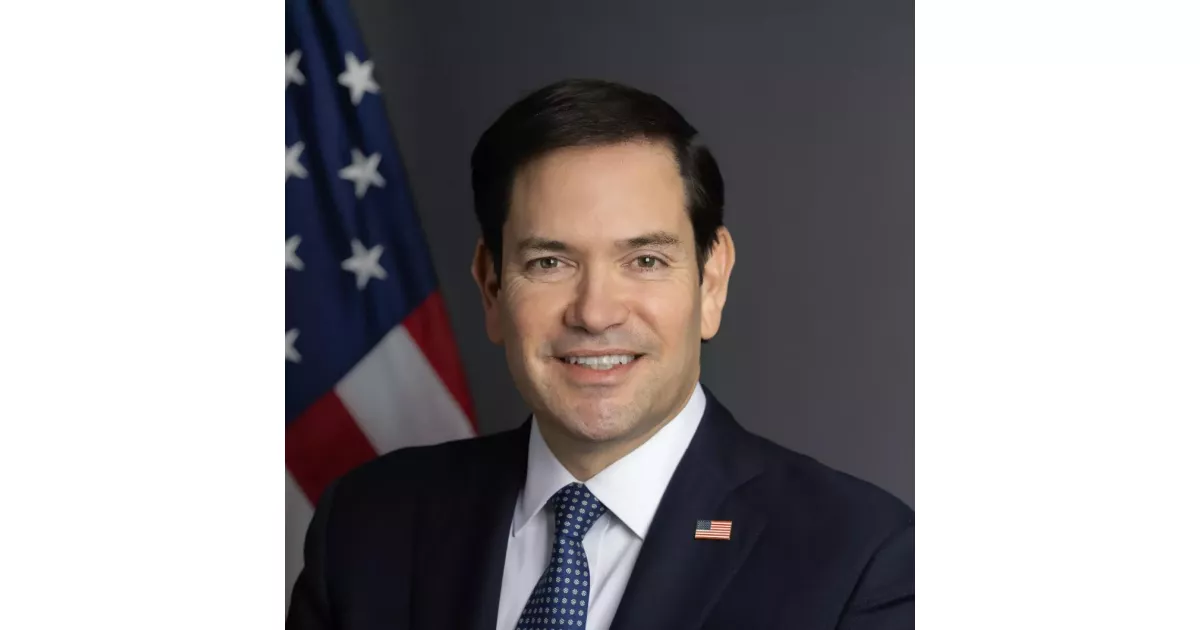From career breakthroughs to professional milestones, explore how Marco Rubio made an impact.
Marco Rubio is an American politician, attorney, and diplomat. He is currently serving as the 72nd United States Secretary of State (since 2025), and also serves as the acting National Security Advisor and acting Archivist of the United States. A member of the Republican Party, Rubio previously represented Florida in the U.S. Senate from 2011 to 2025.
1975: Henry Kissinger Last Served in Both Roles
Marco Rubio became the first person to be both secretary of state and national security advisor in fifty years, since Henry Kissinger in 1975.
1996: Worked on Dole's Campaign
In 1996, Rubio worked on Republican senator Bob Dole's presidential campaign.
April 1998: Elected City Commissioner
In April 1998, Marco Rubio was elected to a seat as city commissioner for West Miami.
December 14, 1999: Placed Second in Republican Primary
On December 14, 1999, Marco Rubio placed second in the Republican primary.
1999: Special Election for 111th House District
In late 1999, a special election was called to fill the seat for the 111th House District in the Florida House of Representatives.
January 2000: Took Seat in Florida Legislature
In January 2000, Marco Rubio took his seat in the legislature in Tallahassee.
January 25, 2000: Won Special Election
On January 25, 2000, Marco Rubio defeated Democrat Anastasia Garcia with 72% of the vote in a special election.
November 2000: Reelected Unopposed
In November 2000, Marco Rubio was reelected unopposed to the Florida House of Representatives.
2000: Elected to Florida House of Representatives
In 2000, Marco Rubio was elected to represent the 111th district in the Florida House of Representatives.
2000: Elected to Florida House
In early 2000, Marco Rubio was elected to the Florida House of Representatives.
2000: Promoted to Majority Whip
Later in 2000, Marco Rubio was promoted to be one of two majority whips in the Florida House.
September 2001: Fasano Resigned as Majority Leader
In September 2001, Mike Fasano resigned as majority leader of the Florida House, and Marco Rubio volunteered to work on redistricting.
2001: Rubio's Tax Reduction Plan
In 2001, Marco Rubio introduced a plan to reduce state property taxes to 2001 levels, potentially eliminating them, while increasing sales taxes to fund schools. The proposal passed the House but faced opposition, leading to smaller changes and a property tax exemption increase.
2001: Legislative Earmarks
In 2001, Marco Rubio requested legislative earmarks totaling about $145 million.
December 2002: Appointed House Majority Leader
In December 2002, Marco Rubio was appointed House majority leader by Speaker Johnnie Byrd.
2002: Legislative Earmarks
In 2002, Marco Rubio requested legislative earmarks totaling about $145 million.
2002: Reelected Unopposed
In 2002, Marco Rubio was reelected unopposed to a second term in the Florida House of Representatives.
2003: Supported Invasion of Iraq
In 2003, Rubio supported the invasion of Iraq, aligning with an interventionist foreign policy approach.
2004: Reelected to a Third Term
In 2004, Marco Rubio was reelected to a third term with 66% of the vote.
September 13, 2005: Became Speaker-designate
On September 13, 2005, at age 34, Marco Rubio became speaker-designate of the Florida House.
2005: Delivered Speech to Florida House
In 2005, when he was chosen as future speaker, Marco Rubio delivered a speech to the Florida House and asked them to create a book of innovative ideas.
November 2006: Elected Speaker of the Florida House
In November 2006, Marco Rubio was elected speaker of the Florida House, serving for two years.
November 2006: Sworn in as Speaker
In November 2006, Marco Rubio was sworn in as speaker of the Florida House.
2006: Florida Enacts Law on Private Property Authority
In 2006, Florida enacted a law limiting the state government's authority to take private property, following the 2005 Supreme Court decision in Kelo v. City of New London. This legislation was proposed by a special committee chaired by Rubio before he became Speaker.
2006: Published "100 Innovative Ideas for Florida's Future"
In 2006, Marco Rubio published the book "100 Innovative Ideas For Florida's Future" after gathering ideas from citizens around the state.
2006: Reelected to a Fourth Term
In 2006, Marco Rubio was reelected to a fourth term unopposed.
January 2007: Crist Takes Office and Clashes with Rubio
In January 2007, Charlie Crist took office as governor and frequently clashed with Marco Rubio. Their most significant disagreement involved Crist's initiative to expand casino gambling, leading to a lawsuit by Rubio that the Florida Supreme Court ultimately sided with, blocking Crist's deal with the Seminole Tribe.
January 2007: Jeb Bush Leaves Office
In January 2007, Jeb Bush completed his term as governor of Florida, and Marco Rubio, as the new Speaker, hired 18 of Bush's aides, leading to speculation about Rubio's office being "the governor's office in exile."
2007: Discussion on Apology for Slavery
In 2007, Tony Hill requested the Florida legislature apologize for slavery, and Marco Rubio supported discussing the idea.
November 2008: End of Speakership
Marco Rubio remained speaker of the Florida House until November 2008.
2008: Farrar Chief of Mission in Havana
From 2008 to 2011, Jonathan D. Farrar was the Chief of Mission of the United States Interests Section in Havana. Rubio believed that Farrar was not assertive enough toward the Castro regime.
2008: Rubio's Support for Apology and Initiatives for Black Youth
In 2008, Marco Rubio expressed support for an apology for slavery, highlighting the importance of symbolic gestures. He also set up a council on issues facing black men and boys, replicated the Harlem Children's Zone in Miami, and promoted literacy and mentoring programs.
2008: Left Florida Legislature
In 2008, Marco Rubio left the Florida legislature due to term limits and began teaching at Florida International University.
2008: Rubio Becomes Adjunct Professor at FIU
In 2008, after leaving the Florida Legislature, Marco Rubio began teaching at Florida International University (FIU) as an adjunct professor under a fellowship appointment.
May 5, 2009: Rubio Announces Candidacy for U.S. Senate
On May 5, 2009, Marco Rubio announced his candidacy for the U.S. Senate seat being vacated by Mel Martínez. He met with fundraisers and supporters before the campaign.
April 28, 2010: Crist Runs Without Party Affiliation
On April 28, 2010, Charlie Crist announced he would run for U.S. Senate without a party affiliation, effectively ceding the Republican nomination to Marco Rubio.
November 2, 2010: Rubio Wins General Election
On November 2, 2010, Marco Rubio won the general election for the U.S. Senate with 49% of the vote. He and Bob Menendez were the only two Hispanic Americans in the Senate at the time.
2010: Elected to U.S. Senate
In 2010, Marco Rubio was elected to the U.S. Senate in a three-way race.
March 2011: Rubio Supports Military Campaign in Libya
In March 2011, Marco Rubio supported U.S. participation in the military campaign in Libya to oust Muammar Gaddafi. He urged for a resolution authorizing the president's decision.
June 2011: Rubio Urges Passage of Authorization for Libya Action
In June 2011, Senator Joe Lieberman and Marco Rubio co-wrote an opinion piece for The Wall Street Journal urging passage of authorization for military action in Libya.
October 2011: Rubio Pushes for Continued Engagement in Libya
In October 2011, Marco Rubio joined other senators in pushing for continued engagement to "help Libya lay the foundation for sustainable security." Soon after Gadhafi was ousted, Rubio warned of the threat posed by the spread of militias and weapons.
2011: Cesar Conda appointed as Rubio's chief of staff
In 2011, Cesar Conda was appointed as Rubio's chief of staff.
2011: Rubio Becomes Influential Defender of US Embargo Against Cuba
In 2011, Marco Rubio became an influential defender of the United States embargo against Cuba. He induced the State Department to withdraw an ambassadorial nomination of Jonathan D. Farrar. Also in 2011, Rubio visited the Reagan Library, praised Ronald Reagan, and rescued Nancy Reagan from falling.
2011: Rubio Takes Office
In 2011, Marco Rubio took office as a member of the Republican Party, representing Florida in the United States Senate.
2011: Rubio Votes Against Budget Control Act
In 2011, Marco Rubio voted against the Budget Control Act of 2011, which included mandatory automatic budget cuts from sequestration. He later criticized linking defense spending to taxes and the deficit.
2011: Rubio Rejoins FIU Faculty
In 2011, after entering the U.S. Senate, Marco Rubio rejoined the Florida International University (FIU) faculty and taught undergraduate courses on Florida politics, political parties, and legislative politics.
March 2012: Rubio Endorses Romney
In March 2012, Marco Rubio endorsed Mitt Romney for president and stated that he did not expect to be selected as a vice presidential running mate, though he was vetted by the Romney campaign.
2012: Rubio Votes Against Fiscal Cliff Resolutions
In 2012, Marco Rubio voted against the "fiscal cliff" resolutions, arguing they would harm small businesses and not address the national debt.
2013: Rubio Involved in "Gang of Eight" Immigration Reform
In 2013, Marco Rubio was part of the bipartisan "Gang of Eight" senators that crafted comprehensive immigration reform legislation. The bill passed the Senate, but Rubio later opposed its consideration by the House.
2013: Republican response to Obama's 2013 State of the Union Address
In 2013, Rubio was chosen to deliver the Republican response to President Obama's State of the Union Address, marking the first time it was delivered in both English and Spanish. His stance against defense sequestration was countered by Senator Rand Paul's call for the sequester to be carried out.
April 2014: Senate reelection decision contingent on 2016 presidential run
In April 2014, Rubio stated that he would not run for reelection to the Senate if he ran for president in 2016, due to Florida law restrictions.
April 18, 2014: Drop in New Hampshire Republican primary voter sentiment poll
According to a poll from the WMUR/University, on April 18, 2014, Rubio dropped to 10th place behind other Republican contenders in New Hampshire's Republican primary voters' sentiment.
November 2014: Push for elimination of "risk corridors"
In November 2014, following the Republican takeover of the U.S. Senate, Rubio advocated for the elimination of the "risk corridors" within the Patient Protection and Affordable Care Act (PPACA), aiming to prevent federal compensation to insurers for their losses. His efforts led to a provision in the 2014 federal budget restricting funding for these risk corridors.
2014: Martinez Succeeds Conda as Chief of Staff
In 2014, Alberto Martinez, Rubio's deputy, succeeded Cesar Conda as Rubio's chief of staff, while Conda remained as a part-time advisor.
2014: Joined Broad and Cassel Law Firm
In 2014, Marco Rubio took a position with Broad and Cassel, a Miami law and lobbying firm.
2014: Republicans Gain Senate Majority
In 2014, Republicans gained majority control of the Senate, giving Marco Rubio and the Republicans significant federal influence.
January 2015: Contacting donors and appointing advisors for potential 2016 run
In January 2015, Rubio began contacting top donors and appointing advisors for a potential 2016 run, including George Seay and Jim Rubright, and instructed his aides to "prepare for a presidential campaign" prior to a Team Marco 2016 fundraising meeting in South Beach.
January 2015: Second place in Zogby Analytics poll
In January 2015, Rubio placed second among potential 2016 Republican presidential candidates in an online poll of likely voters conducted by Zogby Analytics.
February 2015: Reported voting record analysis by Vocativ
According to analysis by Vocativ as reported by Fox News, from January 2011 to February 2015, Rubio missed 8.3% of total votes.
March 2015: Tax plan proposal with Senator Mike Lee
In March 2015, Rubio and Senator Mike Lee proposed a tax plan that included lowering the corporate income tax rate, eliminating taxes on capital gains and inherited estates, creating a new child tax credit, setting the top individual income tax rate at 35%, and replacing the means-tested welfare system with a new "consolidated system of benefits".
April 13, 2015: Launch of 2016 presidential campaign
On April 13, 2015, Rubio launched his campaign for president in 2016, positioning himself as a candidate who could restore the American Dream for middle and working-class families.
April 2015: Rubio Decides to Run for President
In April 2015, Marco Rubio decided to run for president instead of seeking reelection to the Senate.
April 2015: Launched Presidential Bid
In April 2015, Marco Rubio launched a presidential bid instead of seeking reelection to the Senate.
October 26, 2015: GovTrack.us analysis of Rubio's Senate votes
According to GovTrack.us analysis, from October 27, 2014 to October 26, 2015, Rubio voted in 74% of Senate votes.
November 2015: Response to Paris Terrorist Attacks
In November 2015, following the Paris terrorist attacks, Rubio stated that the U.S. should accept no more Syrian refugees because background checks could not be effectively conducted.
February 6, 2016: Criticism from Chris Christie in New Hampshire debate
During a nationally televised debate among Republican candidates in New Hampshire on February 6, 2016, Rubio was criticized by Chris Christie for speaking repetitiously and sounding "scripted".
February 2016: Rubio calls Trump a "con artist"
In February 2016, during the Republican primary campaign, Marco Rubio criticized Donald Trump, calling him a "con artist" and saying that Trump is "wholly unprepared to be president of the United States".
March 15, 2016: Suspension of Presidential Campaign
On March 15, 2016, Marco Rubio suspended his presidential campaign after losing to Donald Trump in the Florida Republican primary.
March 2016: Opposed Merrick Garland's Supreme Court Nomination
In March 2016, Rubio opposed President Obama's nomination of Merrick Garland to the Supreme Court, citing that a nominee should not be considered in the last year of a president's term.
May 17, 2016: Support for Obama's Zika virus emergency spending request
On May 17, 2016, Rubio supported Obama's request for $2 billion in emergency spending on the Zika virus, acknowledging it was a request from scientists and the public health sector to address the issue.
June 13, 2016: Rubio Considers Running for Reelection
On June 13, 2016, after suspending his presidential campaign, Marco Rubio "seemed to open the door to running for reelection" to the Senate, citing the Orlando nightclub shooting.
June 2016: Rubio Reaffirms Concerns About Trump's Access to Nuclear Codes
In June 2016, after Donald Trump became the presumptive GOP nominee, Marco Rubio reaffirmed his February 2016 comments that we must not hand "the nuclear codes of the United States to an erratic individual".
July 20, 2016: Rubio Endorses Trump After Nomination
On July 20, 2016, after Donald Trump won the Republican Party's nomination, Marco Rubio endorsed him.
August 30, 2016: Rubio Wins Republican Primary
On August 30, 2016, Marco Rubio won the Republican primary for the Senate, defeating Carlos Beruff.
2016: Harsh Criticism During Republican Primaries
During the Republican primaries in the 2016 presidential election, Rubio and Donald Trump harshly criticized each other, marking a period of intense political rivalry.
2016: Rubio Backs Trump and Plans Convention Release of Delegates
In 2016, Marco Rubio backed Donald Trump for president, stating that Trump would repeal the Affordable Care Act and appoint a conservative Supreme Court Justice, also confirming his attendance at the Republican National Convention to release his pledged delegates to support Trump.
2016: Rubio as a candidate for president of the United States
In 2016, Marco Rubio was a candidate during the Republican Party primary elections for president of the United States.
2016: Condemned Turkey's Crackdown on Dissent
In 2016, Rubio condemned Turkey's wide-ranging crackdown on dissent following a failed coup.
2016: Views on interrogation techniques for captured terrorists
In 2016, Rubio stated that the U.S. should extract all possible information from captured terrorists and avoid revealing interrogation techniques to the enemy.
January 2017: Speculation of termination of political career
In January 2017, Rubio said he would be a "private citizen", leading to some media speculation of the termination of his political career.
April 5, 2017: Rubio's view on Bashar al-Assad
On April 5, 2017, Rubio commented that Bashar al-Assad felt he could act with "impunity" due to the United States not prioritizing his removal from office.
September 2017: Defense of Trump's decision to rescind DACA
In September 2017, Rubio defended Trump's decision to rescind the Deferred Action for Childhood Arrivals (DACA) program, arguing that it was "unconstitutional".
February 2018: Defended Accepting NRA Contributions
In February 2018, at a CNN town hall following the Stoneman Douglas High School shooting, Rubio defended his record of accepting contributions from the National Rifle Association (NRA). He argued that the NRA's influence stemmed from the millions of people who agreed with their agenda, not just from monetary contributions.
March 2018: Defended Citizenship Question on 2020 Census
In March 2018, Rubio defended the Trump administration's decision to add a citizenship question to the 2020 census, despite concerns from experts and fellow Republicans that it could lead to an undercount of the population.
July 2018: Offered Amendment on Real Estate Purchases
In July 2018, Rubio proposed an amendment to a congressional spending bill that would require companies purchasing real estate with cash to disclose their owners, in an effort to combat the use of illicit funds and anonymous shell companies.
August 28, 2018: Urged Sanctions Against Chinese Officials
On August 28, 2018, Rubio, along with 16 other members of Congress, urged the U.S. to impose sanctions under the Global Magnitsky Act against Chinese officials responsible for human rights abuses against the Uyghur Muslim minority in Xinjiang.
2018: Reversed Position on Climate Change
In 2018, Rubio reversed his previous position on climate change, stating that humans contribute to the increase in greenhouse gases and that sea levels are rising at a measurable rate. Previously, he had rejected the scientific consensus on climate change.
January 2019: Became Florida's Senior Senator
In January 2019, Marco Rubio became Florida's senior senator following the defeat of former senator Bill Nelson.
2019: Defense of Trump's decision to host the G7 summit at Trump National Doral Miami
In 2019, Rubio defended Trump's decision to host the 46th G7 summit at the Trump National Doral Miami, arguing that it would be beneficial for local businesses.
April 2020: Attempt to Stop Obamacare Defeated
In April 2020, the U.S. Supreme Court voted 8–1 against Rubio's attempt to stop the Affordable Care Act (Obamacare).
July 13, 2020: Chinese government sanctions Rubio for interfering in China's internal affairs
On July 13, 2020, the Chinese government sanctioned Rubio for "interfering in China's internal affairs" by condemning human rights abuses in Xinjiang.
August 10, 2020: Chinese government sanctions Rubio for "behaving badly on Hong Kong-related issues"
On August 10, 2020, the Chinese government sanctioned Rubio and 10 other Americans for "behaving badly on Hong Kong-related issues".
September 2020: Applauded Amy Coney Barrett's Nomination
In September 2020, Rubio applauded Trump's nomination of Amy Coney Barrett to the Supreme Court after Justice Ruth Bader Ginsburg's death, a reversal of his 2016 stance.
November 2020: Rubio Announces Third Senate Term Run
In November 2020, Marco Rubio announced he would run for a third Senate term in the 2022 election.
November 23, 2020: Rubio refers to Biden as president-elect
By November 23, 2020, Rubio acknowledged Biden as president-elect, shifting his rhetoric after initially defending Trump's right to challenge the election results.
2020: Democrats Regain Senate Majority
After the 2020 elections, the Democrats regained majority control of the Senate, and Marco Rubio reassumed minority status within the Senate.
2020: Joined Bipartisan Climate Solutions Caucus
In 2020, Rubio joined the bipartisan Climate Solutions Caucus, indicating a shift in his approach to addressing climate change issues.
2020: Support for Judy Shelton's nomination to the Federal Reserve board
In 2020, Rubio supported the nomination of Judy Shelton to the Federal Reserve board of governors, despite bipartisan criticism of her support for the gold standard and other unorthodox monetary policy views.
2020: Defended Citizenship Question on 2020 Census
In March 2018, Rubio defended the Trump administration's decision to add a citizenship question to the 2020 census, despite concerns from experts and fellow Republicans that it could lead to an undercount of the population.
January 2021: Sponsorship of the Uyghur Forced Labor Prevention Act
In January 2021, Rubio sponsored the Uyghur Forced Labor Prevention Act.
May 2021: Argument for Wall Street to stop enabling Communist China
In May 2021, Rubio argued that "Wall Street must stop enabling Communist China" in The American Prospect, calling for a bipartisan awakening to the threat posed by the CCP.
May 28, 2021: Rubio votes against creating the January 6 commission
On May 28, 2021, Rubio voted against creating the January 6 commission.
February 2022: Condemned Russia's Invasion of Ukraine
In February 2022, Rubio condemned Russia's invasion of Ukraine, aligning with international criticism of the Russian aggression.
2022: Reelected to Third Term
In 2022, Marco Rubio was reelected to a third term, defeating Democratic nominee Val Demings.
2022: Condemned 2022 Winter Olympics in China
In 2022, Rubio condemned holding the 2022 Winter Olympics in China, citing the country's "evil, genocidal regime" and vowed to prevent future Olympics from being held there.
2022: Denouncement of the Russian invasion of Ukraine
In 2022, Rubio denounced the Russian invasion of Ukraine and co-sponsored a bill targeting pro-Russian separatist groups.
March 2023: Supported Revoking China's Trade Status
In March 2023, Rubio voiced support for revoking China's permanent normal trade relations status.
November 2024: Trump Chooses Rubio as Secretary of State
In November 2024, Donald Trump chose Marco Rubio as United States Secretary of State in his second administration, confirming this on November 13th.
November 2024: Nominated for Secretary of State
In November 2024, President-elect Trump announced his intention to nominate Marco Rubio to be Secretary of State.
November 2024: War in Ukraine had reached a 'stalemate'
In November 2024, Rubio called Ukrainians "incredibly brave and strong", but said the war in Ukraine had reached a "stalemate" and "needs to be brought to a conclusion" to avoid further casualties.
January 15, 2025: Rubio's Senate Committee Hearing
On January 15, 2025, Marco Rubio appeared before the Senate Committee on Foreign Relations. During the hearing, he called China "the most potent and dangerous near-peer adversary this nation has ever faced".
January 20, 2025: Rubio Formally Nominated and Confirmed as Secretary of State
On January 20, 2025, Marco Rubio was formally nominated by President Trump as Secretary of State. The Senate Committee on Foreign Relations unanimously approved his nomination, and the Senate confirmed him a few hours later by a vote of 99 to 0.
January 21, 2025: Took Office as Secretary of State
On January 21, 2025, Marco Rubio took office as the U.S. Secretary of State.
February 2025: Rubio Reaches Agreement with El Salvador on Deportees and Prisoners
In February 2025, Marco Rubio met with El Salvador president Nayib Bukele and reached an agreement for the country to take in deported foreign nationals who committed crimes, in addition to jailed U.S. citizens and permanent residents.
February 16, 2025: Rubio Dismisses Concerns About Ukraine Peace Negotiations
On February 16, 2025, Marco Rubio rejected concerns about Ukraine and Europe's exclusion from future peace negotiations in the Russian invasion of Ukraine, stating Donald Trump is the only leader who could begin the process.
March 9, 2025: Rubio Condemns Massacres of Syrian Minorities
On March 9, 2025, Marco Rubio condemned the massacres of Syrian minorities committed by pro-government fighters during clashes in western Syria, stating the U.S. stands with Syria's religious and ethnic minorities.
May 1, 2025: Appointed Acting National Security Advisor
On May 1, 2025, Marco Rubio was appointed acting national security advisor, while continuing to serve as secretary of state.
June 27, 2025: Rubio Hosts Peace Agreement Between Congo and Rwanda
On June 27, 2025, Marco Rubio hosted a peace agreement between the Democratic Republic of the Congo and Rwanda, leading to Rwanda's withdrawal of soldiers and a framework for economic integration. President Trump announced future deals for minerals such as tantalum, gold, cobalt, copper, and lithium.
September 2025: Rubio Meets with Mexican President to Discuss Drug and Gun Smuggling
In September 2025, Marco Rubio met with Mexican President Claudia Sheinbaum and Foreign Affairs Secretary Ramón de la Fuente, agreeing to continue cooperation regarding drug smuggling from Mexico into the U.S. and gun smuggling from the U.S. into Mexico.
October 2025: Rubio and Lavrov Prepare for Trump-Putin Summit
In October 2025, Marco Rubio and Russian Foreign Minister Sergey Lavrov began holding discussions in preparation for the 2025 Budapest Summit between Donald Trump and Vladimir Putin.
2025: Rubio's Term Ends
Marco Rubio's term in the United States Senate ends in 2025.
Mentioned in this timeline

Donald John Trump is an American politician media personality and...
Fox News Channel FNC is a conservative American news and...
Ukraine is a large country in Eastern Europe second in...
The Affordable Care Act ACA also known as Obamacare is...

Rand Paul is an American politician and ophthalmologist He has...

Joe Biden a member of the Democratic Party served as...
Trending

2 months ago Russian Drone Attack Ignites Gas Tanker Blaze Near NATO Border After US Gas Deal

Emilio Nava is an American professional tennis player He reached a career-high ATP singles ranking of No on July and...
On May a mass shooting occurred at Robb Elementary School in Uvalde Texas Salvador Ramos an -year-old former student killed...

3 months ago Alexandrova Reaches Ningbo Final, Set to Face Rybakina After Shnaider Victory

6 months ago Cameron Norrie faces Mattia Bellucci in Wimbledon 2025; live updates and scores.

7 months ago Paula Badosa faces tough match against Eva Lys at WTA Berlin 2025.
Popular

Carson Beck is an American college football quarterback currently playing...
Curt Cignetti is an American college football coach currently the...

XXXTentacion born Jahseh Dwayne Ricardo Onfroy was a controversial yet...
WWE Raw a professional wrestling television program by WWE airs...

Stranger Things created by the Duffer Brothers is a popular...

Kristi Noem is an American politician who has served as...
